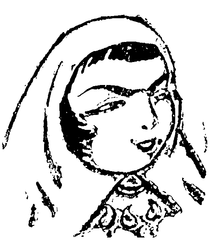| Agha Baji Javanshir | |
|---|---|
 A 1956 imaginary drawing of Agha Baji Javanshir in the Zanan-e sokhanvar A 1956 imaginary drawing of Agha Baji Javanshir in the Zanan-e sokhanvar | |
| Died | 1832 Qom, Qajar Iran |
| Burial | Qom |
| Spouse | Fath-Ali Shah Qajar |
| Dynasty | Qajar (by marriage) |
| Father | Ibrahim Khalil Khan |
| Mother | Tuti Begum |
| Occupation | Poet |
Agha Baji Javanshir (Persian: آغابیگم جوانشیر) was an Iranian poet and public speaker, who was the twelfth wife of Fath-Ali Shah Qajar (r. 1797–1834), the Qajar shah (king) of Iran. She was the daughter of Ibrahim Khalil Khan, the governor of the Karabakh Khanate.
Biography
Agha Baji was the daughter of Ibrahim Khalil Khan, the governor of the Karabakh Khanate and member of the Turkic Javanshir tribe. Her mother was Tuti Begum, the daughter of Javad Khan, the governor of the Ganja Khanate. According to Richard Tapper, Agha Baji was married to the Qajar shah (king) Fath-Ali Shah Qajar (r. 1797–1834) in 1797 after Ibrahim Khalil Khan had sent the body of the previous Agha Mohammad Khan Qajar (r. 1789–1797) to the Iranian capital of Tehran. However, the Iranian historian Parisa Sanjabi states that the marriage took place in 1779/1800, after the death of Fath-Ali Shah's wife Asiya Khanum. By marrying Fath-Ali Shah, she became his twelfth wife. She arrived at the court of Fath-Ali Shah with a retinue of more than 200 servants belonging to the nobility of Karabakh. She was also accompanied by her brother Abu'l-Fath Khan Javanshir. Despite being well-liked at court, she continued to be a virgin for unknown reasons. It has been suggested this was because Fath-Ali Shah considered her father to have had a hand in Agha Mohammad Khan's death. Agha Baji received payment from the profits of Qom and its surroundings and resided in a palace next to the Imamzadeh Qasim with her family.
Agha Baji died in 1832 in Qom, where she was buried. A poet and public speaker, she left a couple verses in Persian and one in Azerbaijani Turkish, demonstrating her fluency in these two languages.
References
- ^ Sanjabi 2019.
- Bournoutian 2021, pp. 261–262.
- Bournoutian 1994, p. 108 (see note 336).
- ^ Tapper 1997, p. 123.
Sources
- Bournoutian, George (1994). A History of Qarabagh: An Annotated Translation of Mirza Jamal Javanshir Qarabaghi's Tarikh-e Qarabagh. Mazda Publishers. ISBN 978-1-56859-011-0.
- Bournoutian, George (2021). From the Kur to the Aras: A Military History of Russia's Move into the South Caucasus and the First Russo-Iranian War, 1801–1813. Brill. ISBN 978-90-04-44515-4.
- Sanjabi, Parisa (2019). "احمدخان مقدم". The Great Islamic Encyclopaedia (in Persian).
- Tapper, Richard (1997). Frontier Nomads of Iran: A Political and Social History of the Shahsevan. Cambridge University Press. ISBN 978-0-52158-336-7.
Further reading
- Davis, Dick (2019). The Mirror of My Heart: A Thousand Years of Persian Poetry by Women. Mage Publishers. ISBN 978-1949445053.